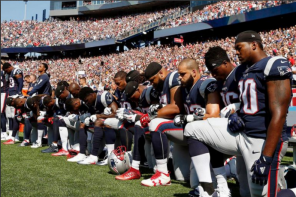I suppose it was inevitable, in its way. Tim Tebow’s remarkable gridiron successes, his imminent NFL draft, coupled with the biblical verses in his eye black—all of these things have made him a media phenomenon. It was probably inevitable that his family should enter that same business.
The Tebow family has been a prominent force for Focus on the Family, an evangelical Christian lobby whose rights of free expression must be respected as intensely as any others (and apparently more so, after the US Supreme Court’s recent decision to reiterate the view that corporations are “persons” from a certain constitutional perspective. Now, in ironic turnabout, one such corporation weighs in to insist that fetuses are persons, too).
But in electing to air a thirty-second Super Bowl advertisement—one in which Pam Tebow refers to her child as a “miracle baby,” only to be tackled to the ground by the rambunctious and apologetic youngest son—the family elders turn their attention to contemplation of the evangelical unthinkable, an abortion, and so they have ironically entered the realm of business. And here, the recent Supreme Court fudging aside, the rights of free expression in a business context do have significant limits.
Gimme that Pro-Bowl Religion
Probing those limits is the question, and the essence of the game. It is a close-run thing and a hard line to draw, to be sure.
Here’s how you don’t draw it. You don’t cry foul based on what you have heard, then seek to exclude the speech before it is spoken because you don’t agree with what you think may be said. A pro-choice advocate needs to find other reasons to object to the ad and its broadcast slot.
Similarly, you don’t say that politics should be left out of the Super Bowl. Tom Brady advocated very publicly for George W. Bush; Barack Obama himself ran an ad during the Super Bowl.
So maybe it’s religion. Maybe religion should be left out of the Super Bowl. Maybe, and yet even here, there’s encroachment. Think of the players all staging group prayers before and after games, or all the coaches and players thanking their Lord and Savior before they thank their fans.
Some cultural observers, like RD’s own Gary Laderman, have pointed out how very religious the ritual and panoply of the Super Bowl has become; he has also suggested that a certain crude intervention, like Janet Jackson’s breast during a Super Bowl halftime extravaganza some years ago, received the outrage it did because it was perceived to be an act of sacrilege within the free-floating social sacred that is the Super Bowl. So long as the religion is non-sectarian, non-denominational, devoid of anything other than marketing content (and not too nude) it is free to be aired at the Super Bowl.
That is one reason why the American viewing public seems prepared to stomach Super Bowl advertisements that offend any number of other ethical sensibilities. The barrage of images at a Super Bowl is relentless: fast cars, fast women, talking animals and infants, cold beer…
You know the drill.
ACT ONE: Watch men pulverize one another on the field.
ACT TWO: Watch men pulverize one another in an ad, then wash down the hurt
with beer.
ACT THREE: Pop the top on a cold frosty one.
Repeat as necessary.
The point is, that’s a comedy. The Tebow family advertisement was seen to be drawing the Super Bowl and its viewing audience closer to the raw edge of tragedy, and it is uncertain, culturally speaking, whether we want to be taken there.
Tim Tebow, Gift from God
But then came the advertisement, surprisingly soon in the first quarter, and if you’d left the room to grab a beer you would have missed it. But the ad ended with a link to Focus on the Family, as the parents testify to their belief that their son, Timothy (named after a prominent New Testament friend of Paul and given that name before he was conceived), was a special gift from the Almighty.
The family patriarch was on a mission trip preaching in the Philippines and prayed to God “for a Timothy,” another preacher to assist him in the work. The pregnancy was difficult and nearly ended many times, but God “spared” the child, just as he has spared him on the field of athletic battle. At the end of the piece, the couple return to their fundamental commitment of faith: their acceptance of God’s often mysterious ways. Since their son has elected to become a football quarterback, not a preacher, the terms of the original Philippine prayer (terms set by the father himself, not God the Father) would seem to have been altered. Then the couple catch themselves, and remind us that their son is a preacher, in his way, as a picture of Tim Tebow with the Bible verses on his cheeks scrolls across the screen.
The really striking thing about the advertisement is, first, how it participates in the new internet strategy of using thirty seconds to direct you to a much longer ad online. “GoDaddy.com” offered several more sexed-up bits to direct the viewers in precisely the same way, if to a different destination. And there you have it: sex on the one hand, pregnancy on the other. The two have been completely separated in the new media. The Tebows never deign to speak of sexuality; the GoDaddy girls never deign to speak of pregnancy, children, or anything of the like.
Another feature of the Focus advertisement, however, is the subtle undercutting of its own message. That message is not quite as simple as a Bible verse inscribed on a player’s cheek, neither the thirty-second spot, nor the longer conversation to which it directs the viewer.
The story the Tebow family wishes to tell is that, while they might have contemplated an abortion, given all of the complications to which the mother was subject, they resisted that temptation and the subsequent birth of their Timothy is surely the sign of God’s special favor.
God’s Will, in Retrospect
But such a story begs all of the hard theological questions; in fact, it denies the very tragedy with which it flirts.
What if, God forbid, Tebow’s mother discovered herself to be pregnant after a forced incestuous liaison, or a rape? What if the child had been born severely handicapped, or if he had died? What if they both had died in childbirth? To read God’s will as divine favor in retrospect is a subtle enough temptation, but it is a temptation to be avoided; precisely when and where tragedy has been avoided.
This was not a “surprise pregnancy” (the term they prefer to “unwanted”), but rather a choice. They, not God, named the child before he was born, and they justified their risky choice by choosing his career at the same time they chose his name (Samuel might have been a more appropriate name).
This curious co-mingling of human and divine choices highlights the darker underside of this ad, and what remains a subtle triumphalism with the power still to shock and dismay. As the arguments prompted by this ad prior to its airing made clear, Tim Tebow has become the argument against abortion, simply by being who he is. It is as if no one can imagine anyone not being moved by Tim Tebow, as if no one can imagine not accepting an interpretation of his life and career as one bestowed upon him by special divine favor (the parents had to remind themselves, and us, at the end of the discussion that their other children are special too).
The real problem here is the same as the assumption that has always hampered the abortion debate: the apparent assumption that the entire viewing audience at the Super Bowl is Christian, and Christian of a particular, evangelical sort. It is important to recall that the Tebow family is a mission family, dedicated to converting others to their faith (presumably even other Philippine Christians, who are deemed to be the wrong kind). In a word, the argument against abortion has become an unsubtle weapon in the larger contest of Christian conversion.
For other religious traditions do countenance abortions, because they do not grant the fetus the same status, nor the same rights, as those that they grant to human beings. These are not aberrant sects; these are prominent forms of Judaism and Islam, among others. All of this is missing in the ad because the family and the groups for whom it advocates miss the non-Christians in the audience and in the country. The whole framework of the anti-abortion argument really amounts to the desire to make the nation more Christian and less Jewish, or less Muslim, or what have you.
While I remain committed to free speech, even and especially at the Super Bowl, it is high time that verses other than John 3:16, John 10:10, and Philippians 4:13 were aired there.




